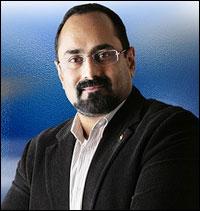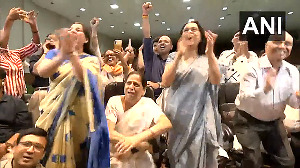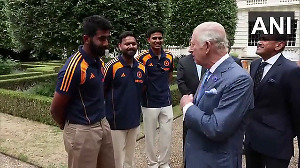
The government has proposed to amend Section 66(A) of the Information Technology Act, which has been dubbed as one of the most draconian laws in the country, as borne out by the recent police action in Maharashtra two young girls for their innocuous posts on a social networking site .
Vicky Nanjappa speaks to member of Parliament Rajeev Chandrasekar, who has been outspoken on this issue and was one of the first to highlight the dangers of the amendment. In the year May 2011, he had warned about the dangers and today he says his fears raised back then have been confirmed by the recent incidents of attacks on the freedom of internet users.
What are your thoughts on Section 66(A) of the IT Act, and what will be the outcome of having such a draconian law and act?
I have been highlighting the dangers of allowing the IT Act and its Rules on the values of our country and Constitution since March 2011. The dangers of the Act, particularly article 66(A), and the IT Rules arise from the vagueness and ambiguity they represent, and the tremendous amount of discretion that law enforcement agencies are either entitled to or exercise while adjudicating complaints under the Act.
The dangers about the likely use of discretionary powers has been highlighted by United States supreme court judge Harry A Blackmun who said, 'By placing discretion in the hands of an official to grant or deny a licence, such a statute creates a threat of censorship that by its very existence chills free speech.'
What are your thoughts and comments on the recent arrests over the Shiv Sena-Facebook row?
The issue and the concerns of misuse of these rules have now started coming home to roost with the recent arrest/intimidation of young Indians attempting to post their views on social networks.
Attempts are being made, of course, to blame the local police and the complainant for such a 'heavy-handed action'. However, that's not the point. This complaint and the complainant would not have a leg to stand on if it were not the vagueness of the IT rules.
What suggestions would you make to regulate the social media?
Governments everywhere, including ours, have the instinctive fear of the internet because it represents free and unfettered views, and, unlike conventional media which is vulnerable to coercion, are completely unmanageable for the establishment.
And that, predictably, makes governments try to fetter this free and vibrant medium; a natural instinct for those in power who fear being challenged. Regulating social media is necessary in certain instances to protect national security and communal harmony, but the framework for such regulation must be evolved through a multi-stakeholder consultation, ie, a bottoms-up approach involving civil society and user communities, and not a top-down approach originating from politicians/bureaucrats.
The way forward is to have a group of experts or a committee working together to aid the IT ministry and concerned MPs in outlining how the language of the rules may be changed.
Based on these discussions and drawing from the industry and our premier academic institutions experienced with questions of law, technology and regulation, such a group can work with the government to put out their final draft on the internet in a time-bound manner. This is an important process without which we will remain exactly where we are today.
What amendments would you suggest to better section 66(A) of the IT Act?
There are many views on the subject. The revised section 66(A) must be evolved after a multi-stakeholder consultation, such as the one described above. The IT Act needs to be addressed on an urgent basis, for which I propose to file a public interest litigation in the Supreme Court shortly.
Do you think Parliament has debated the IT Act enough or has it been passed with no debate?
Most people in Parliament were not aware about it when I first raised the issue of internet censorship in Parliament in May 2011 through a Zero Hour mention.
In August 2011, my colleague in Parliament, P Rajeeve, introduced a motion to repeal these rules. At the end of a good debate on this subject, the IT minister gave an assurance that he would call a meeting of members and stakeholders and implement the consensus that emerged.
The motion was negated based on that assurance. In August 2012, one year after the debate, the minister convened two meetings -- in August 2012 and November 2012 -- but the rules remain un-amended even now.
The way forward is to have a group of experts or a committee working together to aid the IT ministry and concerned MPs in outlining how the language of the rules must be framed.









